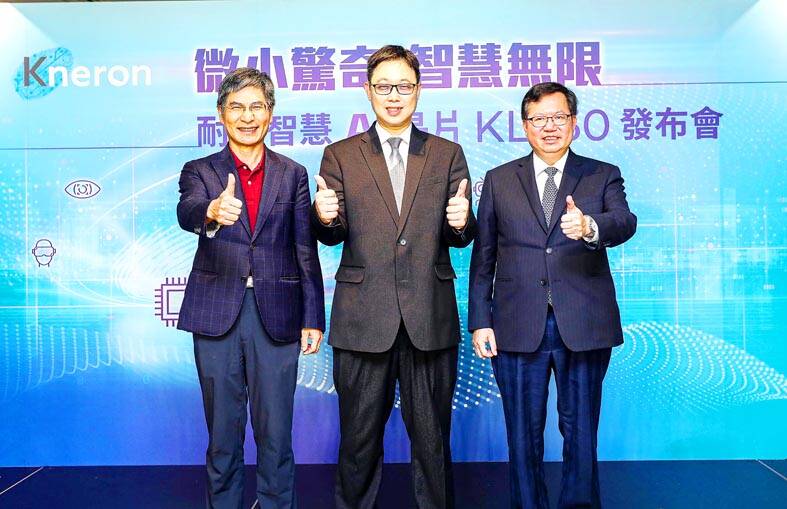Artificial intelligence (AI) chip start-up Kneron Inc (耐能) yesterday unveiled a cost-saving and energy-efficient alternative to Nvidia Corp’s graphic processing units (GPUs) for generative pre-trained transformer (GPT) solutions at scale.
Its new KL730 AI chip deploys Taiwan Semiconductor Manufacturing Co’s (TSMC, 台積電) 12-nanometer process technology for production, Kneron said.
Kneron, based in San Diego, California, is known for pioneering the neural processing unit (NPUs), a special circuit for machine learning algorithms.

Photo courtesy of Kneron Inc
“People have been brainwashed that only GPUs can do AI. GPUs are good at rendering graphics and images, and at optimizing the gaming experience, but high costs and heavy energy consumption make GPUs unaffordable for average businesses and individuals to adopt for AI applications,” Kneron founder and CEO Albert Liu (劉峻誠) told a news conference in Taipei.
“Kneron’s NPU is an AI-dedicated chip and able to do what a GPU can do today, but at a much lower cost,” Liu said.
Quanta Cloud Technology Inc (雲達科技) and Chunghwa Telecom Co (中華電信) have saved up to 75 percent in operational costs after using Kneron’s KL720 NPU in their servers, Liu said.
The KL730 can perform even better, he said.
The KL730 is also 150 to 200 percent more energy-efficient than products manufactured by major industry peers, the company says.
Automakers from Germany and Japan have shown an interest in adopting the KL730 for full-frame detection, a key feature of advanced driver-assistance systems, Liu said.
Liu said he expects autonomous vehicles to become the largest application for NPUs due to their higher average selling prices, followed by servers.
Kneron counts Quanta Cloud, Chunghwa Telecom and South Korea’s Naver Corp among its server customers.
South Korea’s Hanwha Group has adopted its AI chips for use in surveillance cameras, Kneron said.
The KL730 would be available for sampling by customers by the end of this year, the company said, adding that it can be used for enterprise-edge servers, smart home applications and advanced driver-assistance system applications.
Established in 2015, Kneron has raised more than US$140 million, backed by investors including Qualcomm Ventures, Hon Hai Precision Industry Co (鴻海精密), Horizons Ventures Ltd and Sequoia Capital.
Apart from TSMC, GlobalFoundries Inc and United Microelectronics Corp (聯電) are also Kneron foundry partners.

South Korea’s equity benchmark yesterday crossed a new milestone just a month after surpassing the once-unthinkable 5,000 mark as surging global memory demand powers the country’s biggest chipmakers. The KOSPI advanced as much as 2.6 percent to a record 6,123, with Samsung Electronics Co and SK Hynix Inc each gaining more than 2 percent. With the benchmark now up 45 percent this year, South Korea’s stock market capitalization has also moved past France’s, following last month’s overtaking of Germany’s. Long overlooked by foreign funds, despite being undervalued, South Korean stocks have now emerged as clear winners in the global market. The so-called “artificial intelligence

NEW IDENTITY: Known for its software, India has expanded into hardware, with its semiconductor industry growing from US$38bn in 2023 to US$45bn to US$50bn India on Saturday inaugurated its first semiconductor assembly and test facility, a milestone in the government’s push to reduce dependence on foreign chipmakers and stake a claim in a sector dominated by China. Indian Prime Minister Narendra Modi opened US firm Micron Technology Inc’s semiconductor assembly, test and packaging unit in his home state of Gujarat, hailing the “dawn of a new era” for India’s technology ambitions. “When young Indians look back in the future, they will see this decade as the turning point in our tech future,” Modi told the event, which was broadcast on his YouTube channel. The plant would convert

‘SEISMIC SHIFT’: The researcher forecast there would be about 1.1 billion mobile shipments this year, down from 1.26 billion the prior year and erasing years of gains The global smartphone market is expected to contract 12.9 percent this year due to the unprecedented memorychip shortage, marking “a crisis like no other,” researcher International Data Corp (IDC) said. The new forecast, a dramatic revision down from earlier estimates, gives the latest accounting of the ongoing memory crunch that is affecting every corner of the electronics industry. The demand for advanced memory to power artificial intelligence (AI) tasks has drained global supply until well into next year and jeopardizes the business model of many smartphone makers. IDC forecast about 1.1 billion mobile shipments this year, down from 1.26 billion the prior

People stand in a Pokemon store in Tokyo on Thursday. One of the world highest-grossing franchises is celebrated its 30th anniversary yesterday.